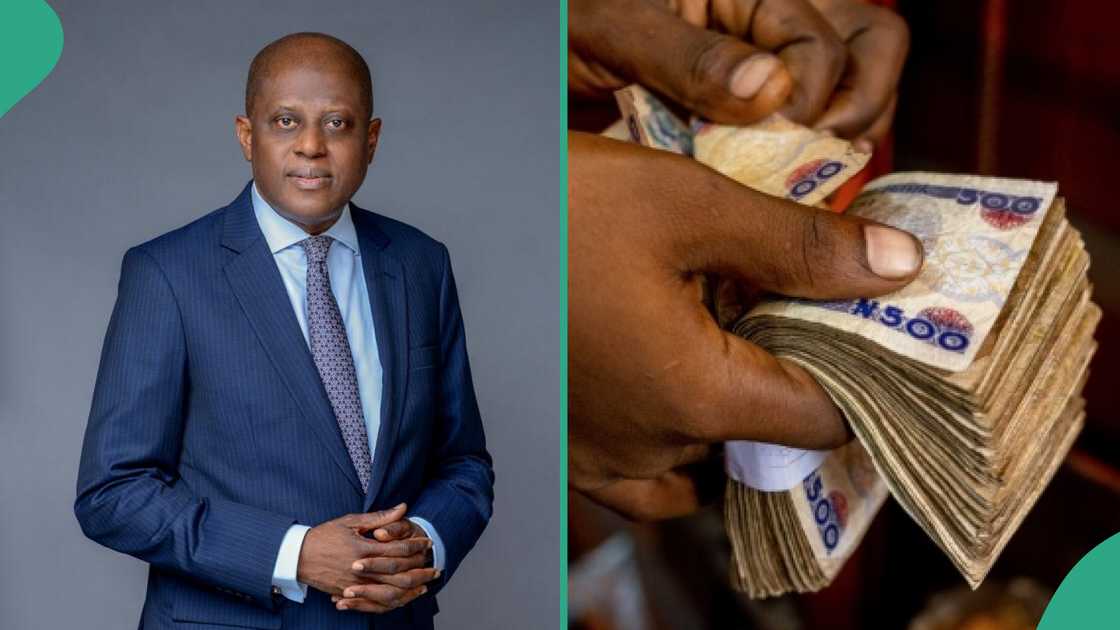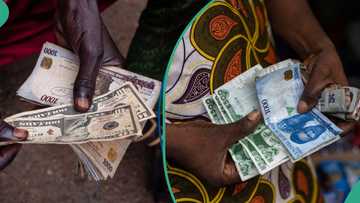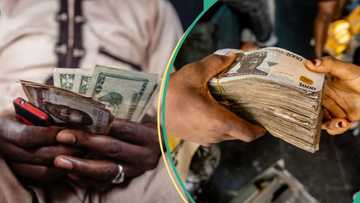Chatham House Warns FG Not to Strengthen Naira, Lists Benefits for Nigeria’s Economy
- Chatham House, London, has warned President Bola Tinubu not to strengthen the naira
- In a statement, the think tank listed out the benefits Nigeria is enjoying from a weaker naira
- It also mentioned a lot of things that could go wrong if the government chooses to halt the naira depreciation
CHECK OUT: Education is Your Right! Don’t Let Social Norms Hold You Back. Learn Online with LEGIT. Enroll Now!
Legit.ng journalist Ruth Okwumbu-Imafidon has over a decade of experience in business reporting across digital and mainstream media.
Amid several interventions by the Central Bank of Nigeria (CBN) to stabilise the foreign exchange market and help the naira appreciate, Chatham House, a United Kingdom (UK) international affairs policy think tank, has warned that strengthening the naira is not in Nigeria’s interest.
Chatham House noted that after its depreciation, the naira is better positioned to help the Nigerian economy progress.
In an article titled ‘Nigeria’s Economy Needs the Naira to Stay Competitive, ’ the think tank noted that while inflation has surged under President Bola Tinubu, strengthening the naira was not the best way to improve the situation.

Source: Getty Images
It argued that the weaker naira has made Nigeria more competitive compared to previous years when the naira exchanged around N460/$.
Chatham House lists benefits of naira depreciation
In the article, Chatham House noted that while it is tempting to strengthen the naira to make imports cheaper and lower inflation levels, the federal government should not take that route.
It said;
“The government must resist the temptation to combat inflation by allowing the naira to appreciate against the dollar. With the naira’s fall, Nigeria is arguably now more competitive than at any time in the past 25 years.
In any developing economy, the most important price is the price of a dollar. If dollars are too cheap, then imports rise sharply. This can make a country financially vulnerable.”
Chatham House further argued in the article that the naira depreciation has improved Nigeria’s Balance of Payments and return of capital into the country, helping the CBN to increase its foreign exchange reserves to prudent levels where it is roughly around the same level as the foreign debts.

Read also
“40% per transaction”: CBN takes action as naira abuse occurs in Abuja, Kano, Ibadan, others
It noted that naira depreciation now allows the government to get the best out of value-added tax (VAT) and corporate income tax paid in dollars since they convert into more funds in the local currency.
Chatham House even argued that Nigeria was worse hit by an artificial exchange rate supported by the government than it was by the fuel subsidies, and with both out of the way, the country’s fiscal deficit narrowed from 6.4% of Gross Domestic Product (GDP) in early 2023 to 4.4% in early 2024.

Source: UGC
Why FG must not strengthen the naira
Chatham House argued in its article that cheaper dollars would incentivise individuals and institutions to move capital out of the country to store in other currencies, and this could affect local industry.
The research group noted that weaker naira could help Nigerian exports by making them more affordable to buyers in other countries. This could improve the country’s trade balance and bring in more foreign currency.

Read also
Access, Zenith, other currency dealers sell dollar at new rate as CBN releases new exchange rate
Although making the naira stronger might seem like a way to reduce inflation by lowering the cost of imported goods, Chatham House warned that it could take away the benefits Nigeria has gained from a weaker currency.
Instead of focusing on strengthening the naira, it recommended other ways to control inflation, such as improving how money flows in the economy and increasing government earnings.
Mr. Ikemesit Effiong, partner at SBM Intelligence, corroborated the statement from Chatham House.
Effiong told Legit.ng that Nigeria does not need a strong currency but a currency that will make it export-competitive.
He said;
"Competitive exports mean more foreign currency earnings. More foreign currency earnings translates to more revenue for Nigerian businesses that will be better able to pay employees better, reinvest and become bigger and globally relevant. In the long run, a better-priced currency is a net asset despite near-term supply shocks."
CBN's attempts to strengthen the naira
Regardless of Chatham House's arguments, the CBN, led by Governor Olayemi Cardoso, has taken several steps to stabilise the naira, though the results have been mixed.
To restore the currency’s value, the CBN has issued various policies and directives. One key move was tightening regulations on Bureau de Change (BDC) operators, introducing new rules to control their activities.
Banks were also given instructions on how to manage the sale of dollars to customers to reduce unnecessary demand.
In 2024, the CBN introduced the Electronic Foreign Exchange Matching System to improve market transparency and help stabilise the naira.
Other measures include stricter monetary policies, clearing outstanding forex debts, and cracking down on those manipulating the currency market.
However, the naira remains under pressure due to high inflation, strong demand for dollars, and low foreign reserves.
Naira reverses gains as USD gets stronger
In related news, the naira suffered a losing week after being hit by investor activities in the FX market.
Data showed that the naira weakened last week, both on the parallel market and the official market.
Analysts say the Central Bank of Nigeria must continue its intervention plans to sustain the earlier naira gains and strengthen the naira.
Article updated with additional information by head of business desk Victor Enengedi
PAY ATTENTION: Сheck out news that is picked exactly for YOU ➡️ find the “Recommended for you” block on the home page and enjoy!
Proofreading by James Ojo, copy editor at Legit.ng.
Source: Legit.ng

Ruth Okwumbu (Business Editor) Ruth Okwumbu-Imafidon is a business journalist with over a decade's experience. She holds both a Masters' and B.Sc. degrees Mass Communication from the University of Nigeria, Nsukka, and Delta State University. Before joining Legit.ng, she has worked in reputable media including Nairametrics. She can be reached via ruth.okwumbu@corps.legit.ng

James Ojo (Copyeditor) James Ojo is a copy editor at Legit.ng. He is an award-winning journalist with a speciality in investigative journalism. He is a fellow of Nigeria Health Watch Prevent Epidemics Journalism Fellowship (2023), WSCIJ Collaborative Media Project (2022), ICIR Health Reporting (2022), YouthHubAfrica’s Basic Education Media Fellowship (2022), Countering the Fake News Epidemic (MacArthur Foundation) 2021, and Tiger Eye Foundation Fellowship. Email: james.ojo@corp.legit.ng




